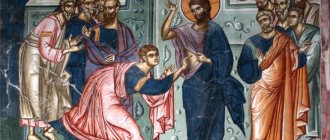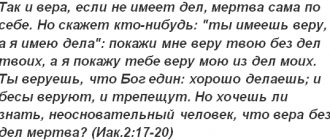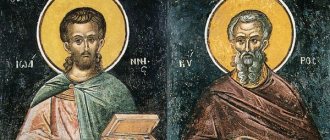"Save me, God!".
Thank you for visiting our website, before you start studying the information, please subscribe to our Orthodox community on Instagram, Lord, Save and Preserve † - https://www.instagram.com/spasi.gospodi/. The community has more than 60,000 subscribers. There are many of us like-minded people and we are growing quickly, we post prayers, sayings of saints, prayer requests, and timely post useful information about holidays and Orthodox events... Subscribe. Guardian Angel to you!
This saint is considered the first martyr who appeared before the Lord in the Armenian city of Melitene. We always turn to each representative of higher powers with some kind of request. In this case, to martyr. Prayers are offered to Polyeuctus Melitinsky for the return of funds. Those who have tried this method say that it is a very effective remedy. In addition, the debtor independently gives back what he took without pressure on him.
Life of Saint Polyeuctus
Memorial Day: January 22
Polyeuctus lived in the first half of the 3rd century in the city of Melitina, which was part of Lesser Armenia. During his military career he served two emperors - Decius (249-251 AD) and Velerian (253-259 AD). Almost all his life, Polyeuctus was a pagan, but virtuous, and was friends with the Christian warrior Nearchus.
In those years, persecution of Christians began, which did not spare Melitina. Nearchus then said to the saint: “Friend, we will soon be separated from you, they will take me to torture, and you, perhaps, will renounce your friendship with me.” To which he replied that Jesus Christ appeared to him in a dream and changed his clothes to light ones. “From this moment,” he said, “I am ready to serve the Lord Jesus Christ.”
Faith and love for Christ flared up in Polyeuctus with a bright flame. He came to the central square, where he tore down the emperor’s decree, by which everyone was obliged to worship pagan idols. When the priests passed by, he knocked the idols out of their hands.
The news of this behavior of Polyeuctus reached the ruler Felox, who was the saint's father-in-law. He, together with the warrior’s wife, tried to convince him and renounce the Christian faith, but the saint was adamant and voluntarily lay down on the block. Thus, in 259, Polyeuctus became the first martyr of Melitina.
Under Constantine the Great, a temple was erected in that city in the name of the holy martyr Polyeuctus. The saint's feast day is celebrated on January 22.
Holy Martyr Polyeuctus
Memory 9/22 January
(MP3 file. Duration 4:58 min. Size 3.6 Mb) Hieromonk Zosima (Melnik)
Polyeuctus and Nearchus lived during the persecution under Decius (249–251). They were Greeks by origin, officers of the 12th Roman legion, then stationed in the city of Melitina in Armenia. They had a deep and sincere friendship. Nearchus converted to Christianity, and Polyeuctus still worshiped idols, despite his many virtues.
The first decree to initiate the persecution required all military personnel to make public sacrifices to demonstrate loyalty to the official cult of the emperor. Nearchus sadly told Polyeuctus that this decree would soon separate them forever. Polyeuctus, already partially instructed in the Christian faith thanks to conversations with a friend, answered, beaming with joy: “No, we will not part, for last night Christ, whom you worship, appeared to me in a vision, took off my military cloak, clothed me in shining clothes and gave him a winged horse.” Polyeuctus realized that this vision contained a prediction about his imminent transfer to heaven, to the glorious cohort of victorious martyrs. For a long time he had been a Christian in his mode of action and disposition of spirit.
He lacked only the title of Christian and the divine seal of holy baptism. Then Polyeuctus and Nearchus began to urge each other to despise the blessings and transitory joys of this world in order to receive heavenly bliss.
Nearchus told Polyeuctus that martyrdom can replace baptism, making a Christian one of the soldiers of Christ, for the Lord Himself dwells in the soul of the martyr. From that moment on, Polyeuctus only wanted to accept martyrdom. He said to Nearchus: “My soul now yearns only for everything heavenly, before the eyes of my soul is only Christ, and His radiance illuminates my face. So let's agree to accept martyrdom together. Let’s go and read the imperial decree.” Approaching the tablet with the decree, the courageous Polyeuctus tore it off in front of the astonished crowd, and then, entering the ranks of the pagan procession, tore the idols from the hands of the priests and smashed them into pieces.
He was immediately captured and brought to trial. Polyeuctus was convicted of sacrilege and tortured. However, nothing could make him stop confessing Christ. The executioners were tired of beating him, trying in vain to dissuade him. Then Polyeuctus began to admonish his father-in-law Felix, the ruler of that region, and tried to break his courage, reminding him of his wife and children. “Which wife? What children? - answered Polievkt. – My thought is no longer here. From now on, it is addressed only to heavenly incorruptible blessings. As for your daughter, if she wants to follow me, she will be blessed. If not, then he will perish with those whom you call gods.”
Then his wife Pavlina came out and began to say in tears: “What madness has befallen you? Who seduced you so much that you destroyed twelve of our gods? Polyeuctus answered: “If I alone defeated twelve of your gods, it means that you will no longer be able to find a god here on earth. Pavlina, all you have to do is come with me and worship the true God. Hasten to exchange this transitory life for eternal, heavenly life.”
Seeing that the ascetic of Christ had overcome even his feelings for his family and thereby converted many pagans, the judges pronounced a death sentence.
Polyeuctus joyfully, with a beaming face, walked to the place of execution, as if liberation awaited him, and with words of encouragement to all the Christians accompanying him. Seeing Nearchus, he greeted him and reminded him of the promise they had made to each other. Then, boldly bowing his head under the sword, he accepted martyrdom and baptism with his own blood. The most pious of the Christians took the body of Saint Polyeuctus and buried it in Melitina, and Nearchus wiped off his blood with a cloth and a year later transferred the relics of his friend to the city of Cananeota.
How does Saint Polyeuctus help?
Childless spouses pray to the Holy Martyr Polyeuctus of Melitino, just as the parents of Euthymius the Great did. Prayer to a saint strengthens faith in the Lord and guides you on the right path.
Those who have not kept a promise or broken an oath, or those who are unable to keep an agreement, pray to Saint Polyeuctus. The saint will give spiritual strength and support in moments of despair.
Most often, the prayer to Polyeuctus is read to repay debts, especially from friends with whom you do not want to spoil relations.
Canon to the Holy Martyr Polyeuctus of Melitino
Song a҃.
Irmos:
Visited without any hindrance, and you can see the sun and the earth, but you can no longer see: the fierce enemy is the water, the flood, and the impassable passage has passed: the song is sung ѧ: where I will catch you, I will become famous.
We are filled with much-desired food, and the blessed dawn, glorious, fulfillment, and the holy face is worthy, your blessed holiday, field Come on, save me, where those who sing: glory have become famous.
Your memory is luminous and auspicious, the light of your life is full of everything, enlightening with the light of faith those who sing praises, He is a warrior in the field of all the blessed, where those who sing: glory has become famous.
Let us live by the strength of our hearts, and by our divine strength, blessed woman, and we will continue to stand firm in the struggle of pride, and for this having deposed him firmly, he cried out to him from the bottom of his heart: where shall we sing, glorified shall we be glorified.
Bgorodichen:
Incarnate, first bodiless, two bcⷣe, gave birth to the same, all-immaculate and all-everything, two abiding, riches of blessings for us. For the beggar, and for the savior, the call: Glorious and glorified.
Song of the city.
Irmos:
You are more resolute than those who flow to you, where you are, you are the light of the darkened, and my soul sings.
I changed all this wood for the sake of goodness, more than compatible with the life of the world, the field.
Victory desires, everything was given to us, more glorious on earth, and to us we have been favored by us.
We wished for glory, even more so than for the world, for the sake of our patience, and for the shamelessness of our people.
Bgorodichen:
Direct my, my dear, steps, and let me go to your praiseworthy life.
Sedalen, voice є҃.
He is a good warrior, he has given all his blessings, he has given all his blessings to his love, Yes, a faithful warrior, and also with you, my dear. Moreover, having suffered legitimately, it is worthy to get married in a place where, more than anything else, we deserve it.
Glory, and now:
In the І҆ѻARDANISM ѡ҆нѧѧѧ, and in the most glorious way, in the same way, the Adam’s nature has been updated, abbr. In other words, we say it before. At the same time, we praise you, and we all glorify you.
Song of the day.
Irmos:
You are my fortress, where you are, you are my strength, you are my god, you are my joy, you do not destroy the depths of my soul, and our poverty is visited ́въ. In the dark, with a venerable cry: to your strength, glory, love-loving man.
By pious confession, all the time, he brought himself to the same, and for that, more gloriously, the generation of love above all, and vice of all If you were free. Here you are crying out: glory to you, love of humanity.
The sweetness of beneficence is for you, inspired by our sacred love: with pure and bright desires, and With love we kindle the highest tsrⷭ҇tvїѧ, sing songs to the word: Glory to your strength, man-loving.
Naturally, in the same way, the verbs “glasiv” for the goodness of the faith, bg҃omꙋ́dre mꙋ́ cheniche poljekte: truly much-desired and kindly worthy of his lordship.
The slaughter of all the armies, the kingdom of all that is immovable, the new slaughter has entered into everything, even with dripping blood: Here we are, the Prime Minister, with unfailing joy, and eternal light, and great glory.
Bgorodichen:
Similar to the one on earth, the nbⷭ҇nyy, nbⷭ҇nyѧ sїѧ̑ soda, and having suffered a passionate nature, a divine dispassionate gift of communion: Today we glorify the birth of our undisputed brothers and sisters.
Song є҃.
Irmos:
Sunrise, the light of yours, the light that never comes, and covered the place with the anticipation of the dark, but our brothers ѧ, and to the light of your commandments, direct my prayers.
May the most blessed, blessed, red life, and the quality of nature, and sweetness, and glory, and life itself be despised. Yes, and I did not fail in your hopes.
Secret of the secrets, solid for perfect feats: and according The poor bearer of the world, the imperishable ones, made them worthy of the crowns, the field.
The most ungodly honor, the most hateful and hateful nature of the world, the most pious religion, and the gods of the world have been overthrown. All of you, kindled with pious zeal, and filled your heart with God, more glorious.
Bgorodichen:
In your words, first and foremost, we honor you: having created truly great things with you, magnify you , the true death of death, birth and death of yours, show.
Song of ѕ҃.
Irmos:
There is an abyss of sins, and the sinners see it, and in the deepest sense they cry: but your strength I give my space, to Petrovi, and to the governor! and saved.
China a҆́gggalskagѡ ᲂu҆dost́ilsѧ є҆sѝ, dear ꙋ́ndne mꙋ́cheniche, а҆́гг҃лськаꙋyu jealousy ꙗ҆́вѣ show: with them ᲂу҆́бѡ is proper And, blessed one, pray for relief from the misfortunes of those who sing about you.
Ou҆snꙋ́л є҆ѕѝ kindness, more suffering, due sleep, ѿѣѧ with the head of the sword, є҆suffering: and now on our lot is imperishable inherited from him, from the watermen.
According to him, the bearer of suffering was for our sake, for the sake of the cross: and now, blessed woman, with him, ꙗ҆ Kozhe ѡ҆bѣshcha, tsrⷭ҇tvꙋyou live forever.
Bgorodichen:
And we are merciful, we gave birth to a loving word, we saved our lives and our lives: that is why we Please, everyone, the representative of the invincible, stizhahom.
Song z҃.
Irmos:
Bzh҆їѧ condescend to ѻ҆́гн how ashamed in vаvѷlѡ́nѣ sometimes, now for the sake of ѻ҆́́гн in the cave with a joyful foot, ꙗ҆́кѡ in ts The vegetative face is cheerful, singing: blessed be the blessing of ours.
I showed you, my servant, your strength: now, for the sake of my heart, I am self-proclaimed for my feats, and the victorious , blessed be the god of ours.
Glorious and all-famous holiday of yours, martyr, will rise: for your lord brings light, and shines with the call of the world: Thank you for our blessings, bless you.
Wealth is inseparable, abiding and indestructible, but forever abiding in all glory, today: blessed bg҆tє́ts ours.
Bgorodichen:
Beginningless to the parent of the present dream, once conceived, conceived, two, incarnate, she gave birth to her, for whom she saved the faith, calling: blessed bg҃y ѻ҆tє́ts ours.
Song and.
Irmos:
By the sevenfold furnace of the Chaldean scourge, the godly fury kindled, and by the power of the best they were saved by this species, the creator and the savior who cried out. Above: Fathers, bless, priests, sing praises, people, exalt to all ages.
Holy days today, your many-prayerful remembrances, for the most blessed and blessed He was a true sacrifice, who sacrificed for you for the sake of the victims. And the saints bless, the priests sing, and people extol for all ages.
Suffering resistance, more patient, even to the point of blood having been shown on the earth, in the field, in the many-lighted palace on all of us, on your bloody lands. Now I am taking a bath, and I say: priests, sing, O people, exalt to all ages.
Restore my life, which was killed by the fall, to your martyrdom, your boldness, to your divine commandment, to your martyrdom, more glorious, to this day. Let us cry out to virtue: priests, sing praises, O people, exalt them to all ages.
Bgorodichen:
I'm glad, for the sake of our joy forever. I am glad that the sadness has been resolved, and Adam’s lament to the Lordship of his brothers. Glad, you who were born incarnate, two of you, who are faithful to the representative, who are exalted to all ages.
Song ѳ҃.
Irmos:
Oh, the horror of all the words of the indescribable life of descent, by the highest will from down even to the flesh, from the two wombs of beings man. Moreover, with great respect, we magnify you.
Come to God, martyr-lovers, let us remember the martyr, and glorify him with his holy name, the highest, and honest On the day of honoring, and wedding, and life-giving virtues of beauty.
The pages of the martyrdom and the exhausted blood of yours were crushed by the most hostile people in the world, and the church saved us I dreamed of you, blessedly, in faith I dreamed of bliss.
Be with me, my helper, from various misfortunes and deliverances from you, and from solving your heresies and your daring I pray for the prison with your prayers, chanting with pure, more glorious thoughts.
Bgorodichen:
The law and its previous heads are born, and its fullness, all-pure, gave birth to it, for the benefit of the vast, immeasurable reasons of humanity, honor us. May He grant you good and save you through the faith of those who magnify you.
Luminous.
The much-desired desires, and the much-desired wealth of heaven, and the blessed field! and glory and lightness: in the past, and in the crown of the world, with martyr faces the martyr is true.
Glory, and now:
In rabbi ѻ҆́́́рзѣ came є҆сѝ, є҆сѝ, и҆ baptism їѧ flightless ꙗ҆́кѡ people asked, ᲂzhasѧ ѧ earth ѧ̀ and ҆ nb҃o, and ҆ and Repair the water, and water nature. The forerunner accomplishes everything with fear and joy.
Texts of prayers to the holy martyr Polyeuctus
Troparion, tone 4
Thy martyr, Lord, Polyeuctus, in his suffering received an imperishable crown from Thee, our God, for having Thy strength, overthrow the tormentors, crush the demons of weak insolence. Save his souls with our prayers.
Kontakion, tone 4
I will bow my head to the rescue in the Jordan, crushing the head of the serpent, and the head of Polyeuctus, cut off by the shame of the flatterer.
Canon prayer
Holy Martyr Polyeucte! Look down from the heavenly palace on those who require your help and do not reject our petitions, but, as our constant benefactor and intercessor, pray to Christ God, that He who loves mankind and is abundantly merciful will save us from every cruel situation: from cowardice, flood, fire, sword, invasions of foreigners and internecine warfare. May he not condemn us sinners for our iniquity, and may we not turn the good things given to us from the All-Bounteous God into evil, but into the glory of His holy name and into the glorification of your strong intercession. May the Lord, through your prayers, give us peace of mind, abstinence from harmful passions and all defilement, and may He strengthen throughout the world His One Holy, Catholic and Apostolic Church, which He has acquired with His honest Blood. Pray diligently, holy martyr, may Christ God bless the power, may He establish in His holy Orthodox Church the living spirit of right faith and piety, so that all its members, clean from wisdom and superstition, worship Him in spirit and truth and diligently care about keeping His commandments, May we all live in peace and piety in this present world and achieve blessed eternal life in heaven, by the grace of our Lord Jesus Christ, to Him belongs all glory, honor and power, together with the Father and the Holy Spirit, now and ever and unto ages of ages. Amen.
Another prayer to the holy martyr Polyeuctus
O holy martyr Polyeucte! Hear us now, who fervently pray to you. Pray for us, servants of God (names), that we may get rid of all sorrows, illnesses, troubles and circumstances and live piously in our present life, walking in the commandments and justifications of the Lord blamelessly. Ask us for forgiveness of sins, bodily health, correction of life and eternal salvation, as if by your warm intercession we are saved, we will be worthy to send glory in the Trinity to our glorified God, the Father and the Son and the Holy Spirit, now and ever and unto the ages of ages.
( 2 ratings, average: 4.50 out of 5)
How does prayer to a saint help?
You can pronounce words in front of an icon for various reasons. In most cases, it is advised to do this on Memorial Day, January 22. He is considered the keeper of contracts and oaths. But besides all this, they turn to him with their requests:
- childless spouses for the gift of children;
- to strengthen faith and take the right path;
- for not breaking a given word, promise;
- to support and give strength in moments of despair.
But most often the prayer to Polyeuctus is aimed at repaying debts, especially if it concerns people with whom you do not want to spoil relations. After all, sometimes we lend and cannot even imagine that this could cause serious discord. Often money is the basis for breaking relationships even between the closest people.
“Holy Martyr Polyeucte! Look down from the heavenly palace on those who require your help and do not reject our petitions, but, as our constant benefactor and intercessor, pray to Christ God, that He who loves mankind and is abundantly merciful will save us from every cruel situation: from cowardice, flood, fire, sword, invasions of foreigners and internecine warfare. May he not condemn us sinners for our iniquity, and may we not turn the good things given to us from the All-Bounteous God into evil, but into the glory of His holy name and into the glorification of your strong intercession. May the Lord, through your prayers, give us peace of mind, abstinence from harmful passions and all defilement, and may He strengthen throughout the world His One Holy, Catholic and Apostolic Church, which He has acquired with His honest Blood. Pray diligently, holy martyr, may Christ God bless the power, may He establish in His holy Orthodox Church the living spirit of right faith and piety, so that all its members, clean from wisdom and superstition, worship Him in spirit and truth and diligently care about keeping His commandments, May we all live in peace and piety in this present world and achieve blessed eternal life in heaven, by the grace of our Lord Jesus Christ, to Him belongs all glory, honor and power, together with the Father and the Holy Spirit, now and ever and unto ages of ages. Amen."
Do not forget that if, when asking, you think about your enrichment at the cost of someone else’s losses, then the saint will definitely punish you for this. Your thoughts must be pure and your heart open. If you simply say the words, you will not get any result, since the prayer to the holy martyr Polyeuctus will not come from the heart. In this case, faith in the Lord is important, because a saint is only a conductor between us and the Lord.
The best article for you, go to: Strong prayers for good trading and success in selling goods
You shouldn’t constantly ask for something, much less demand something from the Almighty. Sometimes you just need to thank Him for what you already have. Such actions will endear you to the saints even more.
God bless you!
You will also be interested in watching a video story about the holy martyr:
“He chose faith himself”: the image of a Christian martyr in Pierre Corneille’s tragedy “Polyeucte”
Interest in the history of Armenia awoke in the theater of Western Europe from the beginning of the 17th century, when, during the period of persecution by Shah Abbas, Armenians, forced out of the Ararat Valley, began to move not only deep into Persia, but also to Western European countries, in particular to France, about which a special report has been preserved letter to Louis XIII. The first play, where among the characters was not a historically specific ruler of Armenia named Tigran, but bearing the name of several Armenian kings, was the tragicomedy of the English playwrights F. Beaumont and D. Fletcher “The King and No King” (1611).
Since the 1620s, various historical subjects of Armenian history began to appear in Italy, then in Spain, but the most significant number of dramatic works about Armenia were created by French writers of the 17th century. Claude Delidel and Nicola Marie Defontaine, Georges de Scudéry and Gillet de la Tessonnerie, Thomas Corneille and Pousset de Montauban - all these, of course, are names now little or completely unknown even to great theater lovers. However, among the authors who paid tribute to the Armenian theme is the famous classic of French drama, Pierre Corneille. He addresses this topic twice - first in the tragedy "Polyeuctus" (1641), and 10 years later - in the tragedy "Nycomedes" (1651), where the main character is in love with the Queen of Armenia, Laodice.
By the time of the creation of Polyeuctus, Corneille had already become famous for the tragedies “The Cid” (1636) and “Horace” (1640). They started talking about him as “an ancient Roman among the French,” creating images of solid, chivalrously brave, exceptional maximalist heroes. Following the techniques of classical heroic-political tragedy already established in his work, this time the playwright depicts a “Roman” character in the image of a noble Armenian nobleman of the royal family who sacrificed himself in the name of the Christian God.
The character’s courage, firmness, constancy, heroic maximalism - everything that made Corneille’s contemporaries admire “feelings of which they no longer consider themselves capable” - received an unexpected rethinking in the modern production of “Polyeucte”, carried out by the famous French director Brigitte Jacques-Vagement at the Theater Abbess in Paris in the fall of 2016. The actualization of the classic tragedy was prompted by the actions of ISIS in Iraq and Syria (the destruction of ancient statues in Mosul, the temples of Palmyra), as well as the brutal terrorist attack that occurred in the fall of 2015 at the Bataclan concert hall in Paris. Jacques-Vazhment presented Corneille's play as a play about modern religious fanaticism, removing some of the monologues, adding instead Nietzsche's words about the dangerous contagion of fanaticism and martyrdom. Meanwhile, despite the topicality of such an interpretation, it does not capture the deep meaning of Corneille’s play and even distorts it, and therefore I would like to pay special attention to the author’s intention of the play and the context in which it was created.
The Christian Nearchus and the pagan Polyeuctus were warriors and true friends in the world. Nearchus often poured out the cherished beliefs of his soul to his pagan friend, and, without a doubt, they were not alien to the pure and sublime heart of Polyeuctus.
“Our soul is in itself a Christian,” said Tertullian. Probably, the soul of Polyeuctus was ready to perceive divine truth and was only waiting for an opportunity. This opportunity presented itself. In 259, the Roman Emperor Valerian began persecuting Christians.
Great sorrow took possession of the soul of Nearchus when the royal ban on the Christian faith was announced. It was not for his own fate that the holy martyr was alarmed; he was tormented by the thought that Polyeuctus would renounce him when he was given over to torment and death for a faith alien to the pagan soul. The thought of eternal separation from a friend became the beginning of martyrdom for Nearchus...
Polyeuctus’s loving, sensitive heart did not hide his friend’s sadness. Having learned about its reason, he himself was struck by the thought of the separation ahead of them. For the first time it became clear to him to what extent he had long shared his friend’s beliefs.
- Nearchus! - he exclaimed, to his friend’s great surprise. -What are you afraid of? Do I not know your Christ? Didn’t my heart burn within me when you talked about Him, when you read the Gospel to me! Only I have not yet been called by the name of a Christian, but I abhor idols and have always felt faith in Christ, the Son of the one true God...
- Glory to the mercy of God! - Nearchus prayed, hearing these words. - But do you love God so much that you would leave your wife, children, and wealth for his sake?
“I don’t need anything other than the true God,” answered the pagan. - From this hour I renounce the world and will serve Him alone...
And in a fit of inexplicable and uncontrollable feeling, he rushed to the city square, where, having read the royal decree, he tore it up in front of the people. And when he saw that they were carrying idols into the temple, he rushed towards them and crushed them...
For what he had done, Polyeuctus was immediately captured and tortured. In vain did the wife and father-in-law beg not to destroy themselves, not to make them unhappy. The martyr answered them only with requests so that they would know the true God, so that they would be convinced how insignificant those deities were, which he could now so easily crush into dust.
Many of those standing around believed and followed the words of the martyr. Seeing his firmness in confessing the faith of Christ, the torturers condemned him to death.
With triumph and love, Polyeuctus looked at the crowd surrounding him, and, seeing Nearchus, addressed his last words to him:
- Take heart, friend! Remember the covenant of love that was established between us!.. - And he bowed his head under the sword and gave up his soul to God.
He was the first martyr in Armenian Melitina, near the right bank of the Euphrates. Following him, Nearchus also suffered martyrdom.









